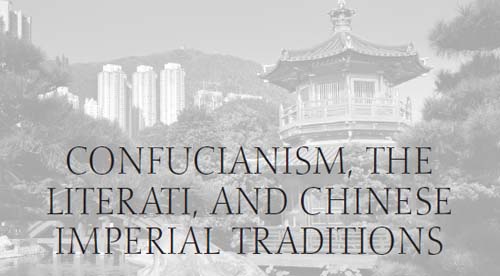Confucianism, the Literati, and Chinese Imperial TraditionsHistory and Sources |
Who was Confucius and what do we know about his life? |
According to traditional accounts, Confucius was born around 551 B.C.E. and died in 479 B.C.E., making him an almost exact contemporary of the Buddha. The name by which he is most commonly known, Confucius, is a Latinized form of Kong Fu Zi, Venerable Master Kong. According to tradition, his mother, Yan Zheng Zai, had prayed on Mount Ni that she would have a child. Confucius’ father, Shu Liang He, died when the child was three years old, and his mother raised him under difficult circumstances. At nineteen, Confucius married and had a son and a daughter. His marriage, which was not very happy, would end with the death of his wife, and his son died during Confucius’ life.
At twenty-two, he began the first of several jobs for the state of Lu. At twenty-six (some say thirty-three), Confucius went to the Zhou dynasty’s imperial capital of Lu to study royal ceremony and seek a government position. There he is said to have met the aged Lao Zi. Traditional accounts of that meeting (with a decidedly Daoist slant) report that Lao Zi took Confucius to task for wasting effort on formal study and reliance on ethical absolutes. He would do far better to observe how nature accomplishes all good things without contrivance, effortlessly. Still Confucius pursued his effortful path. He spent many years teaching privately and sought to win converts to his ethical and political views. At about fifty, he won a minor governmental post. But he failed to gain the public recognition he craved. Hoping to find a willing political patron, he went into a thirteen-year self-imposed exile, wandering in and out of nine provinces. Confucius returned home at the age of sixty-eight, there to spend his last five years studying and editing the Classics. The Master had a passion for fostering the kind of order in society that he felt sure could offer genuine happiness. He sought to articulate a view of the individual who could contribute to society through selfmastery and personal responsibility.

